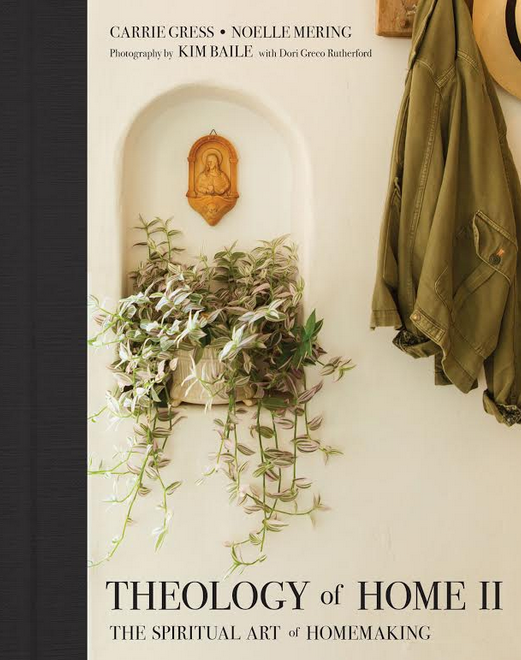A new book brings encouragement and inspiration to anyone who cares about making home a haven.
Lenten Campaign 2025
This content is free of charge, as are all our articles.
Support us with a donation that is tax-deductible and enable us to continue to reach millions of readers.
The idea that serving others gives life meaning is not new. In fact, it’s integral to the Gospel message. But in a culture that often values gratification as the highest goal, this belief can seem positively radical.
Pope Francis has talked about the “throwaway culture” that prioritizes productivity and personal pleasure over loving others as they are and subordinating human impulses to God’s will. In secular circles, too, there has been a growing reaction in recent years against the culture of thoughtless consumption and convenience.
Something in our culture speaks to a longing for an old-fashioned ethic of service and meaningful work. We see this manifested in the slow food movement and a resurgence of all things homemade and hand-crafted.
But the current craze for “slow living” leaves the picture incomplete. Somehow there’s a failure to connect these trends with homemaking itself as an art, a discipline, a practice. Crafts and cooking are relegated to casual hobbies, but the real heart behind these activities—the homemaker—is missing.
Choosing a life of service, oriented toward a goal of physical and spiritual fruitfulness instead of striving after power and status symbols, seems regressive at best. Being a homemaker and happy about it almost sounds oppressive. But such a life can lead to real and lasting happiness.
“Thinking power is our purpose really sets us up for frustration,” said Noelle Mering, co-author of Theology of Home II: The Spiritual Art of Homemaking. “Any endeavor you enter into for sake of your own power will bring anxiety as you are focused on competition and comparison and what others think of you. But if you engage in the same endeavor for the sake of love, it will lead you to peace.”

Theology of Home II, the sequel to the highly successful Theology of Home, is a treasure of a book. This new release from TAN Books deeply captures the beauty of caring for a home, for the sake of those in it. There is joy in this vocation, the book shows us, and service and fruitfulness make for a rich and meaningful life.
The term “homemaker” might call to mind a stay-at-home mom of many children, but that’s not a complete picture. Theology of Home II makes it clear that this vocation is for everyone. Mering explained,
We hope to reach women of all sorts, whether a working mom, a stay-at home mom, a woman struggling with infertility, an older woman whose children are grown, a professional woman who’s not a mom. We tried to tease out a common thread in what womanhood is called to. That’s also why we wrote about religious sisters and spiritual motherhood quite a bit.
Homemaking doesn’t just apply to women either. “Homemaking is a shared endeavor, and this vocation is for men, too,” Mering said. “My husband takes our home more seriously than his occupation. We know that his occupation is for the sake of our family and our home life.”
The heart of the book speaks to women, however, and indeed it features women in all walks of life. There are interviews with a great-grandmother, a mom of young children who works outside the home, childless women, religious sisters, and many others. What unites them all is a life focused on spiritual fruitfulness, imitating Our Lady in her love and service for others.
The power of Theology of Home II is that it uplifts this way of life, revealing the goodness and joy it brings. “Often women look to other women for inspiration and for an embodiment of what they’re supposed to do,” Mering said. “I hope women look to this book and see there is another way of being that leads to our happiness, a way of being that resonates with them deeply.”
Of course, the profound message of Theology of Home II isn’t just for women looking for another way of being, besides what the world is proposing. Even those who know the purpose of this vocation can struggle to find motivation.
Just last week, a friend texted me, “I’m so burned out on homemaking. Do you ever feel this way?” This friend is a mother to many small children, and because of the pandemic restrictions, has had little help or relief from their endless demands. Even when one knows this work is vital and meaningful, it can be easy to lose sight of the big picture in the repetitive work of cooking, cleaning, and physically caring for little ones.
“There’s this book you have to read,” I wrote back. Theology of Home II is the best kind of encouragement. Its message can inspire any woman, especially those struggling to see the beauty of a hidden life spent in service to those they love.

This year, when many of us are at home much more than usual, this book has a needed and timely message: Being at home with family, and spending time and energy caring for the home, can be richly rewarding.
The book does not answer the question of “how to” do homemaking, but “why.” It can remind women of what’s really important and help us to lean into our vocations, even when the going is hard. To that end, it’s filled with incredibly moving stories, on topics including grieving and facing hardship, but what results is very hopeful, offering solidarity and encouragement for every stage of life.
Ultimately, the message of Theology of Home II is the heart of Christianity, which is to seek holiness and do God’s will above anything else. Through stunning images and eloquent words, the authors vividly uphold ancient truths like the corporal and spiritual works of mercy and Christ’s teaching to “Love your neighbor as yourself.”
“The shift we want to propose here is that, while women are powerful, power is not our purpose. Our purpose is love,” Mering said. “This book was born out of love for women and families and a desire to share the deep, beautiful way we’ve experienced that shift in our own lives.”
What makes Theology of Home II so incredible is how it presents this way of life as not just accessible but attractive. What would change in our lives if our role models were women of real holiness and immense love, instead of whoever has the best fashion or the biggest social media following? Theology of Home II presents goodness and charity as aspirations, making it a book to reread again and again, to share with others, and to cherish for a lifetime.

Read more:
The hidden power of homemaking
Read more:
Homemakers Project: Renewing the Culture of the Home








